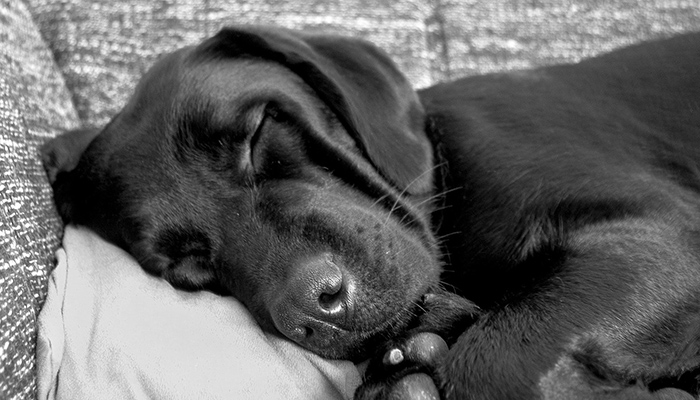What sleeping animals can tell us about our sleep

Sleep and consciousness researcher, Associate Professor Bruno van Swinderen studies fruit flies to learn more about sleep, as they have much simpler brains than humans. The evolution of sleep and animal sleep, can tell us a lot about why we need sleep, why we dream and what exactly consciousness is.
Related:
- General anaesthetics do more than put you to sleep
- Podcast: General anesthetics and consciousness
- Flies show the true value of sleep
- Flies sleep just like us
Animal sleep questions answered
Q: Why do some animals sleep for much longer than others? For example, a lion sleeps for around 20 hours a day but a cheetah sleeps for 12 hours.
A: This is a big mystery. Even worse, ungulates (cows and antelopes and such) only sleep for a couple (maybe 3-4) hours. At the other end, some bats sleep about 18 hours. Flies sleep about 8-10. Clearly this has nothing to do with intelligence or brain size. It all relates to the multiple functions of sleep, and how these can be accommodated into an animal's specific niche.
Q: Do fish sleep?
A: Yes. All animals with a brain sleep, as far as this has been carefully examined. I think there may be a male bullfrog out there that doesn't sleep, but it's probably in a pretty ragged condition. If they don't sleep, there will be a price to pay at some point. Some animals get all their mating done without sleeping much. The price to pay is an early death. This has not been a good evolutionary strategy in general.
Q: Do Drosophila (fruit fly species) show similar spontaneous sleep patterns to humans?
A: It isn't known whether larval flies sleep, although key sleep-like functions probably happen during metamorphosis, as has been shown in the nematode C. elegans. These relate more to development, and deep sleep is like a mini-development in a way, with physical changes happening at synapses. Personally, I don't think fly larvae show spontaneous sleep patterns; I think that, like nematodes, their sleep-like functions are all linked to programmed developmental changes.
Q: Would you say that as developmental complexity of an organism increases, the need for sleep increases? Does the importance of sleep decrease in lower order organisms such as invertebrates with shorter life cycles? I would think that their biology would be skewed towards more 'core' functions such as reproduction?
A: I think that the key 'complex' point in evolution associated with sleep need, is the brain can selectively pay attention to the world. Before that, sleep 'functions' were just molecular processes linked to developmental transitions, often associated with quiescence. After that, sleep was also a need to acutely ignore the world for a while so as to be able to pay attention to it properly while awake. So it isn't so much a linear increase in complexity as a step function. That's a hypothesis, though.
Q: So many animals sleep like us. Why do worms need to sleep? Do flies sleep like worms?
A: By worms, you probably mean nematodes (C. elegans), which is where the sleep research was done. I don't think worms sleep in the same way flies and humans do. I think that some aspects of their development have similarities with some (deep) sleep functions, but I don't think they have a 'sleep switch', meaning the capacity to rapidly and reversibly turn off responsiveness to the outside environment. By the same token, I don't think worms have a selective attention. Carrying this further, I think consciousness emerged from animals that have attention. This co-evolved with a need to sleep, to curate those attention mechanisms. This is just a hypothesis, but worth debating I think. Basically, nematodes aren't conscious. Flies are.
Q: Is it relatively as easy to wake most animals from sleep as humans?
A: It is almost impossible to wake up a severely sleep-deprived fly. When my friend Paul Shaw first started looking for sleep in flies, we would spend all-nighters trying to keep them awake, tapping on the tubes they were housed in. I can tell you that after a couple days of sleep deprivation, these flies were not budging. But they weren't dead — they just needed sleep. This is a fundamental criterion for measuring sleep in animals, called 'increased arousal thresholds'. Without that, animals could just be quietly vigilant.
Q: Which animal dreams the most?
A: The natural history of dreaming is a fascinating question. Recent work shows that even reptiles dream. I'm not sure which animal dreams the most, but I've heard that echidnas and marsupials in general have a lot of REM sleep. With humans, it is known that infants (even already in the womb) dream a lot more than adults. It all begs the question what dreaming is for, if it's in most animals and exists even before humans have narrative experiences they can talk about.
Q: What do dreams look like to other animals? Does my dog dream about chasing balls? Do they have weird trippy dreams like we do?
A: Sleep has multiple functions, this has been one of the confusing things about sleep: one word for several different functions, which have all been packaged into a time when the brain is 'offline'. These functions probably include: synaptic homeostasis (keeping synaptic strength within an optimal range - this is important, there are a trillion of them in your brain), waste clearance, memory consolidation, stress regulation, emotional and motor learning.
Read more Q&A on this reddit AMA.

